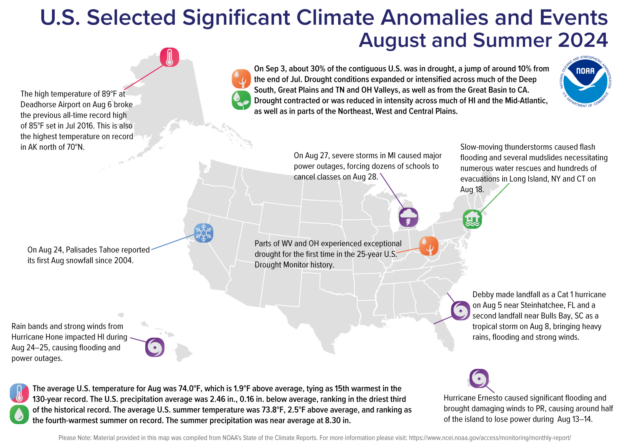A warmer-than-average August wrapped up an extremely hot summer across the U.S., with many cities breaking all-time heat records.
The first eight months of 2024 also ranked as the second-warmest year-to-date, according to NOAA’s National Centers for Environmental Information.
The average temperature for August across the contiguous U.S. was 74.0 degrees F — 1.9 degrees above average — tying with August 1998 as the 15th-warmest August in the 130-year record. Florida had its second-warmest August on record, while Texas and New Mexico both saw their third-warmest August on record.
The average precipitation for the contiguous U.S. in August was 2.46 inches (0.16 of an inch below average), ranking in the driest third of the climate record, NOAA reported.
Precipitation was below average across much of the South, with Alabama and Mississippi seeing their driest August on record, and Tennessee seeing its second-driest August. In contrast, New York saw its fourth-wettest August on record.
For meteorological summer, June through August 2024, the average temperature for the contiguous U.S. was 73.8 degrees F — 2.5 degrees above average — ranking as the nation’s fourth-hottest summer on record.
Arizona, California, Florida, Maine and New Hampshire recorded their warmest summer on record.
The summer precipitation total across the contiguous U.S. was 8.30 inches — near average — ranking in the middle third of the historical summer record, NOAA reported.
Michigan saw its fifth-wettest summer on record while West Virginia had its fifth-driest summer.
The average U.S. temperature for the first eight months of 2024 was 56.9 degrees F — 3.0 degrees above the 20th-century average — ranking as the second-warmest such YTD in the climate record.
New Hampshire, Vermont and West Virginia each saw their warmest January–August period on record, NOAA analysis showed.

The nation had 22.93 inches of precipitation for the YTD, 2.23 inches above average, ranking as the 10th-wettest such YTD on record.
Rhode Island and Connecticut saw their second-wettest January–August on record.
Several cities across the West, South and East had their warmest summer on record, based on their average temperature for June–August.
- Phoenix, Arizona: 98.9 degrees F.
- Fort Lauderdale, Florida: 84.6 degrees F.
- Grand Junction, Colorado: 80.1 degrees F.
- Dulles, Virginia: 78.1 degrees F.
- Hartford, Connecticut: 75.5 degrees F.
- Caribou, Maine: 67.3 degrees F.
Three tropical systems impacted the U.S. in August.
- Debby made landfall as a Category 1 Hurricane on August 5 near Steinhatchee, Florida, and a second landfall as a tropical storm near Bulls Bay, South Carolina, on August 8. The storm brought heavy rains, flooding and strong winds to the Southeast.
- From August 13-14, wind and rain from Tropical Storm Ernesto battered Puerto Rico, causing significant flooding and power outages for nearly half of the island.
- Rain bands and strong winds from Hurricane Hone impacted Hawaii from August 24-25, causing flooding and power outages.
One new billion-dollar weather and climate disaster was confirmed in August 2024 — a severe weather event that impacted the central and eastern U.S. in mid-June.
There have been 20 separate billion-dollar weather and climate disasters so far this year. The total cost of these events exceeds $53.0 billion, and have resulted in at least 149 fatalities.





















 Nearly 26.2M Workers Are Expected to Miss Work on Super Bowl Monday
Nearly 26.2M Workers Are Expected to Miss Work on Super Bowl Monday  Earnings Wrap: With AI-First Mindset, ‘Sky Is the Limit’ at The Hartford
Earnings Wrap: With AI-First Mindset, ‘Sky Is the Limit’ at The Hartford  20,000 AI Users at Travelers Prep for Innovation 2.0; Claims Call Centers Cut
20,000 AI Users at Travelers Prep for Innovation 2.0; Claims Call Centers Cut  Lessons From 25 Years Leading Accident & Health at Crum & Forster
Lessons From 25 Years Leading Accident & Health at Crum & Forster 




